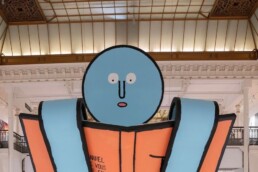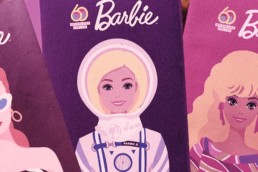What does sustainability mean? Do you feel our daily choices can impact changes that will create a better tomorrow? How can we involve the kids in this process to better understand and respect our world?
On January 2017, I had the opportunity to meet Katie from Pirouette, at The Nest – Pitti Bimbo in Florence. The Nest is a project created in collaboration with Pitti Bimbo and Little popup. 15 independent labels where presented to reflect quality, sustainability and echo the voices of the small yet healthy business model.
When Katie asked me to make a blog post at Pirouette, I felt truly excited as this would give the opportunity for an important topic: Sustainability.
“… when resources are consumed faster than they are produced or renewed, the resource is depleted and eventually used up. In a sustainable world, society’s demand on nature is in balance with nature’s capacity to meet that demand.” —Global Footprint Network
Starting from us individually or in groups of families, schools, workplace these questions are truly important to address. Each person can choose to participate in this process regardless of their income. Some consider carefully what they wear, what they eat, to recycle, upcycle and reuse and if we go through the daily activities, these are choices that makes us considerate and respectful to our planet. What we as a family, for example, consider to be a solution, is to think twice before making a decision, to discover and support slow and careful productions as well as local stores. Alongside, to find games that inform and involve our kids, including planting or to clean up waste found inside the sea. To play a lot with natural materials such as wood, stones, marble and encourage imagination.
How can we create a better sustainable living? The best way, is to ask ourselves every time – without becoming extreme but by balancing our choices – what do we support by choosing a specific item. Do we support a fair production, that secures its people a normal living? Do we support good quality materials that do not destroy our planet? Do we choose food that is made to cause good, instead of harm, to our bodies? Do we support local stores? Do we support crafts people that live and work for their passion? These are some questions we can raise to awaken us before going to the shops, to a supermarket, to a restaurant, to a grocery store etc. Also a critical question is, do we actually need this? Will it last long…obviously for non grocery items? Although our voices are strong, because at the end business is formed by demand, producers are equally important. But how can producers take more care? In other words, what resources are used? How can energy used promote positive change? Are traditional techniques staying alive into our modern days? How can we remove toxic chemicals and fabrics from our planet? Such a call for question, change and action, would be important from all sides.

What about the fashion industry? looking into bigger industries, it is obvious that this matter concerns us all. In 2011, Greenpeace started a campaign DETOX MY FASHION. This is an enormous effort to explain that we do not need to overuse our resources.
Also, Dame Vivienne Westwood, has been protesting for many years for an environmentally friendly fashion environment and her shows often mirror such ideologies, as recently seen on the collection titled Ecotricity. The show notes read: “What’s good for the planet is good for the economy/what’s bad for the planet is bad for the economy.”
Sadly to say, many consumers have lost their faith in fashion and they choose only with one criteria: PRICE. That is why this high demand, has caused so much productions in this direction. Consumers have lost the feeling that the fashion designers create and sustain a team or a healthy production chain. They mainly believe that some items are overpriced, without any particular reason. Such customers, are a very big part of the world and in order to believe they need to feel trust again. Price is an important factor for some and this should be fully respected. And at the end of the day, everyone should have the right for dressing up in style. So fashion should not be a privilege for a few, as everyone deserves the right to luxury, taking it into a humanistic point of view. But a high quality production, sustaining a healthy chain needs to have a price that makes sense and not be cheap. Therefore, it is important to bridge again the gaps, while building sustainable results and healthy dialogue between such institutions and consumers, while finding solutions for all.
The idea is to keep a balance. To allow fashion, arts, food and crafts to flourish without misuse. To create together a network of likeminded people who wish to encourage the importance of sustainability. To enable collaborations between bigger industries and creative individuals or businesses and allow space for more to exist and exchange while keeping authenticity.
This is also the effort of Little popup. ‘ Little popup wants to instill in the younger generation the need for a conversation about quality and sustainability: to teach our children to take a breath, creating a moment to pause and ponder our choices as consumers. We live in a fast-paced world, but Little popup invites you to join a community where we can slow down together and make responsible and creative decisions’.

by Dimitra Zavakou, Little Pop Up & founder of The Nest at Pitti Bimbo
If you are interested to join the Little popup community, please check our following projects: Yuma love x Little popup Roadshow / April through to June
The Nest at Pitti Bimbo with Little popup / 22 -24 June 2017 List of exhibitors
Read a Pirouette feature on the first edition of The Nest, here.
Featured images
Project to raise awareness of future generations about the importance of using recycled materials
Photographer: Gaby Herbstein
Illustration: Pablo Bernasconi
Katie Kendrick
Katie is a specialist in kids’ fashion and lifestyle, editor, consultant, content creator, and owner of Pirouette - a leading resource to the industry.
With a keen interest in both the business and creative aspects of the industry Katie has interviewed buyers, agents, stylists, designers, influencers, covered runway shows, produced trade show reports and curates thought provoking and engaging exhibitions.
She is passionate about good design, creativity and brands that manage to combine this with their environmental responsibility.
Subscribe to Pirouette's monthly Newsletter.
You might also like
February 29, 2024
Jean Jullien’s ‘Paper People’ at Le Bon Marche Rive Gauche, Paris
If you're in Paris make sure to pop into Le Bon Marche, Rive Gauche - there you will encounter two gigantic blue paper people created by Jean Jullien. Art set in a retail space ensuring an enhanced…
October 6, 2021
Pirouette kicks back into action
After being hacked & disabled we're back to bringing the whats what in Kid's fashion & lifestyle! Pirouette has been a little quiet for a while. In part at least because I've been working for…
August 27, 2020
Little Creative Factory AW20 collection ‘Unexpected Poetry’ launches today!
It's been a year since founder and designer of Little Creative Factory made the big move to the even bigger Apple with her lovely family. What a year it has been, there's no stopping this family…
November 12, 2019
Pirouette #CoupDeCoeur: Quiet Town Shower Curtains
The covetable shower curtain is quite the elusive thing to discover, however Brooklyn based Quiet Town's wonderful designs are something a little bit special. Discover Pirouette's #CoupDeCoeur Quiet…
October 21, 2019
Maison Mangostan x Melijoe
Sneaker addicts at the ready! Colourful and covetable footwear label Maison Mangostan and Pirouette favourite kid’s fashion retailer Melijoe have come together to create a very special limited…
September 27, 2019
Photography: The Many Faces of the Grown Man’s Self – Léa Wormsbach
Proving studio shoots need not be boring - a rich deep colour palette can project a luxury aesthetic and stand out from the saturated tendency of standard catalogue shots. The photography of Léa…
September 9, 2019
Reebok x The Animals Observatory 2nd Collab
The Reebok Classic Nylon Sneakers receive The Animals Observatory colour treatment in this their second collaboration and they are available now! View their eye-catching primary colour sneaker…
August 26, 2019
Back to School with Melijoe.com (Editors Picks) AW19 FW19
Melijoe.com Editors Picks AW19 FW19 - Girls As we know everything has to come to an end - even the long playful days of the school holidays must give way to the chime of the school bell. It's not…
July 18, 2019
Barbie at 60 with Laura & Katie
Katie & Laura talk Barbie.Katie invites Laura from Velveteen to the Barbie exhibition held at Pitti Bimbo 88 earlier this year. So how has the iconic Barbie evolved over time, from being an…













